Impact
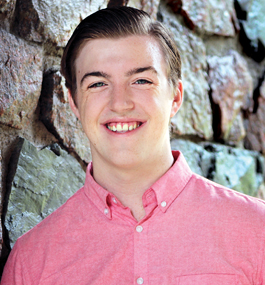
Bryan McNamara ’19
A Scholarship That Honors a Pulitzer Winner’s Legacy
When you’re the inaugural recipient of a scholarship named for a Pulitzer Prize-winning historian and emeritus professor, it makes sense to think big. Bryan McNamara ’19, the first student to receive the David Hackett Fischer Endowed Scholarship, pictures himself one day running for Congress.
“I’ve always believed you put up or shut up,” he says. “If you see a problem in the world, you have to try to change it.”
David Hackett Fischer taught at Brandeis for 55 years, becoming one of the university’s most beloved professors and one of the world’s leading historians, winning the Pulitzer in 2005 for his book “Washington’s Crossing.” When he retired in 2017, grateful alumni sent in donations to establish an endowed scholarship in his name.
McNamara says he’s honored to be the first Fischer Scholar. “Professor Fischer is someone I have a great deal of respect for,” he says. “Trying to live up to that legacy is a great challenge to have.”
A New York native, McNamara interned in high school for Sean Patrick Maloney, the state’s first openly gay representative in the U.S. Congress. Campaigning door-to-door for Maloney came naturally — the president of his school’s debate team and a musical theater actor, McNamara wasn’t shy.
He came to Brandeis as an Early Decision applicant, and majored in history and politics. “It’s important to add historical context to any political discussion,” he explains.
McNamara believes he’s benefited from the history department’s approach, which encourages students to question their viewpoints. For instance, McNamara says, Govind Sreenivasan asks the students in his World History to 1960 class to “read about the history of a culture from an outsider’s perspective. It helps you see what biases you’re bringing into the situation, and what motivated contemporary observers to describe events and cultural phenomena the way they did.”
During his junior year, McNamara studied abroad at the University of Edinburgh. The first five weeks, he took classes on Scottish politics and the U.K. government. Over the next 10 weeks, he got hands-on experience as an intern for a member of the Scottish Parliament.
But his time in Scotland wasn’t all about politics. An active member of the Undergraduate Theater Collective at Brandeis, McNamara performed in “The Glass Menagerie” with the Edinburgh University Theater Company. And his status as team captain of the Brandeis rugby club came in handy when he represented the Scottish Parliament in games against the Irish Parliament, part of a series of friendly matches between European governmental bodies.
McNamara returned to Brandeis with a renewed sense of purpose. “There are still people in politics and in the world who are trying to make a difference,” he says. “As a whole, we’re a country of good, caring, hardworking people who just want to see their families do well, and we need to get back to that messaging rather than blaming one another.”
As he approaches graduation, McNamara is especially grateful for the scholarship support that enabled his experiences at Brandeis. “I would not have had the opportunities elsewhere that I’ve had here,” he says. “The David Hackett Fischer Scholarship made everything possible.”
Bill Friedman ’65, a lead donor to the scholarship fund, remembers being a student in one of Fischer’s first classes at Brandeis. “I was fortunate to take Professor Fischer’s American Colonial History class in 1962,” he says. “He gave us a window into the craft of history and treated us as fellow scholars. From the very beginning of his career, David Hackett Fischer stood out.”
Richard Weintraub ’73 was likewise inspired to give by his memories of Fischer. He remembers seeing the historian walking around Goldfarb Library with a stack of volumes, presumably in the process of writing a lecture or a book. Yet no matter how busy he was, he took the time to give every student personal feedback on every paper. “In Professor Fischer, I saw how good a professor could be,” Weintraub says.
Daniel and Sarah Rueven, both ’09, salute Fischer’s lasting impact on their lives. “Professor Fischer was a remarkable professor, mentor and friend,” says Sarah. “We had the privilege of experiencing several of his courses and seminars during our studies in the history department, and his lessons remain at the forefront of our minds a decade later.”
“His unique storytelling ability and way of describing a specific scene, policy or historical event is indelibly etched in our memories,” Daniel says. “He is a treasure to the academic world, and it was our great honor to help endow a scholarship in his name.”
— Brian Klotz

Zamira Korff
A Framework for Our Future
As President Ron Liebowitz reminds us, Brandeis is at a critical inflection point in its evolution. What began as a daring undertaking 70 years ago has emerged as one of the nation’s premier universities. Now, under the president’s leadership, we have the opportunity to determine the path Brandeis will take for decades to come.
This vital work is encompassed in A Framework for Our Future. Launched by President Liebowitz last fall, the framework focuses on three initiatives. These priorities will chart the future course of our university and position us for success in the rapidly evolving higher-education landscape.
The first initiative is to redefine the student experience to best support our students as they become critical thinkers, engaged citizens, and leaders in their communities and professions. The second is to commit to the highest standards of research, scholarly inquiry, and the pursuit and creation of new knowledge. The third is to honor our founding values, including our commitments to the American Jewish community, and our engagement with Jewish ideas and issues.
President Liebowitz has formed task forces to explore these areas of strength and opportunity. Their work will serve as the foundation for realizing a new vision for Brandeis.
As members of the Brandeis community, each of you has a role to play in this process. We value your ideas and your experiences as you consider what has made Brandeis special to you over the years, and what your hopes and dreams are for future generations of students. Please visit the Framework website to share your ideas in support of this vital endeavor.
Sincerely,
Zamira Korff
Senior Vice President of Institutional Advancement
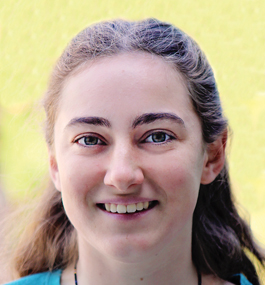
Erin Magill ’22
Cohn Gift Reduces Student Debt at Brandeis
The largest gift in Brandeis’ history — 2017’s $50 million bequest from the estate of Chicago philanthropists Rosaline and Marcia Cohn — has significantly reduced many Brandeis students’ education loan debt or eliminated it altogether.
“The Cohn Foundation gift has enabled us to better assist families in affording a Brandeis education while also allowing us to minimize student loan debt,” says Sherri Avery, assistant vice president of student financial services.
Through the gift, Brandeis has met the full calculated financial need of more than 1,000 first-year students, sophomores and juniors, by means of scholarships, subsidized loans (unsubsidized loans have been eliminated) and work-study programs. Calculated financial need is based on a formula that takes into consideration the costs of tuition, room and board, and other expenses, as well as family income, assets and benefits.
Starting next year, the university will be able to meet the full calculated financial need of all undergraduate students. For many current students, that would mean a reduction of between $1,000 and $2,000 in loan debt for the 2018-19 academic year and continuing through graduation.
“The Cohn Foundation gift has allowed Brandeis to begin to make strides in reducing overall student loan debt for our needy students,” says Avery. “If we were to receive more gifts of this nature, we could further reduce students’ aggregate loan debt at graduation.”
The gift was established to provide financial aid to Brandeis students who, in the words of Rosaline Cohn, will help solve the “problems and conditions of today and tomorrow.”
Because of the gift, 18 of this year’s 25 Justice Louis D. Brandeis Scholarship recipients now have their full financial need met without loans, an increase of about $5,500 in scholarship assistance per student per year. This is important to students like Erin Magill ’22, a first-year recipient from Montpelier, Vermont.
“Receiving this scholarship enables me to attend Brandeis and take advantage of the great education it has to offer,” says Magill, who plays clarinet in the Wind Ensemble, and is a long-distance runner on the women’s track and field team. She’s interested in pursuing a degree in linguistics.
“I’ve been enjoying Brandeis a lot,” she says. “I like that everyone seems really interested in something. Not all my friends are interested in the same things, but everybody has something they really enjoy studying.”

Olivia Leavitt ’19
Bad Bounce Leads to Excellent Outcome for Brandeis Tennis
Two years ago, Ben Lamanna, head coach of the Brandeis men’s and women’s tennis teams, was watching Jonathan Cordish ’90 — who was nationally ranked throughout his Brandeis tennis career and helped the Judges advance to the NCAA Division III National Championships in 1989 — play in an alumni match on one of the university’s outdoor courts.
A fast serve to Cordish hit a crack and bounced wildly, causing him to mishit his return. Cordish turned to Lamanna and said, “Ben, that bounce is going to cost me a lot of money.”
“I realized the tennis facilities had just not kept pace with the caliber of the program Ben had built,” Cordish says today. “Someone had to step up to ensure Brandeis had facilities that could sustain the teams’ accomplishments.”
So Cordish and his wife, Melissa, also ’90, made a lead gift to establish the Cordish Tennis Center. The project will involve both a thorough overhaul of the outdoor courts and the development of a new outdoor facility. The target date for completion is this fall.
“To have a leading national program, you need great facilities, and this gift is going to transform ours,” says Lamanna. “We’re extremely grateful to Jon and Melissa.”
In 2016, the couple made the lead gift for a project that refurbished the indoor tennis courts at the Gosman Sports and Convocation Center. Lamanna credits that effort as being “instrumental in helping our team develop.”
Student-athletes on the tennis team expect the most recent gift to provide an immediate boost to the program. “It’s going to transform the Brandeis tennis team and help us attract top recruits across the nation,” says Olivia Leavitt ’19, senior captain of the women’s program.
“Coach Lamanna and his players represent what’s best about Brandeis and its values,” says Cordish. “Ben’s goal is to develop young people who have both character and a work ethic — tennis is just the means to that end. Melissa and I are proud to help give Brandeis a first-class showcase for what he and these students do.”
— Matthew Parillo
Picture-Perfect
A photo gallery from events and meetings around the world.
Wien Anniversary
The Wien International Scholarship Program’s 60th anniversary was celebrated in March.
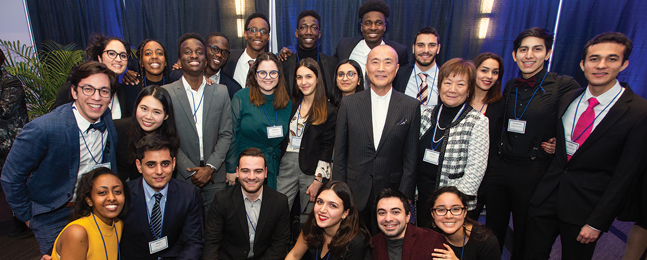
Past and present Wien Scholars surround entrepreneur and philanthropist Toshizo “Tom” Watanabe ’73, a former Wien Scholar, and his wife, Hidemi.
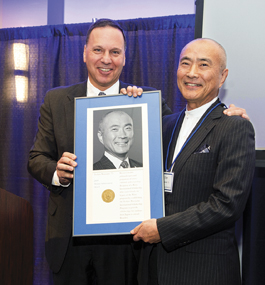
President Ron Liebowitz presents an Alumni Achievement Award to Watanabe.
AAAS Celebration
In February, the university commemorated the 50th anniversary of the Department of African and African American Studies with a weekend of discussions, performances and events.
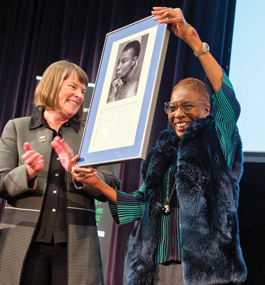
Hortense J. Spillers, PhD’74, receives an Alumni Achievement Award from Provost Lisa M. Lynch.
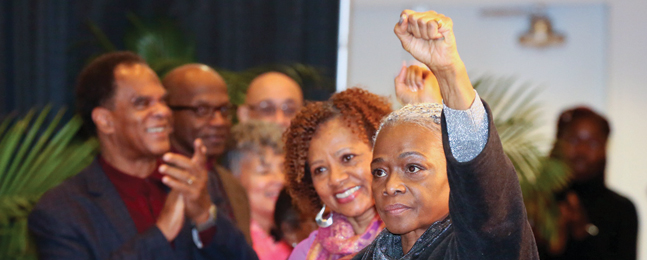
A panel revisited the 1969 student occupation of Ford Hall, which led to the creation of the AAAS department.
Presidential Reception

President Ron Liebowitz met with alumni in Seattle in November.
Evening With a Nobel Laureate
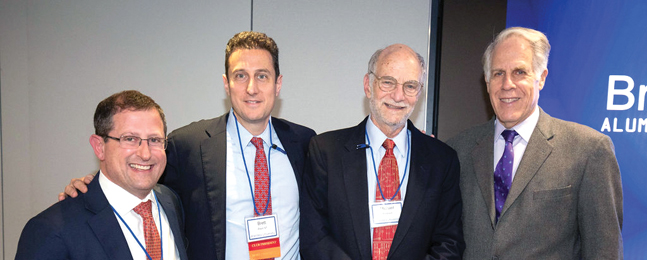
Nearly 200 alumni, parents and friends gathered in New York City to hear biologist Michael Rosbash (second from right) discuss his Nobel-honored research at Brandeis.
Conversation at Heller

Chuck Rosenberg, former senior FBI official and U.S. attorney (left), talked with Dean David Weil about impeachment, treason and the complexities of the Russia investigation at a Heller School event.
Get-Together in Shenzhen

Ruth Aronson, director of leadership gifts (center), and Kathryn Graddy, dean of Brandeis International Business School (right), visited with parents and friends in Shenzhen, China.
